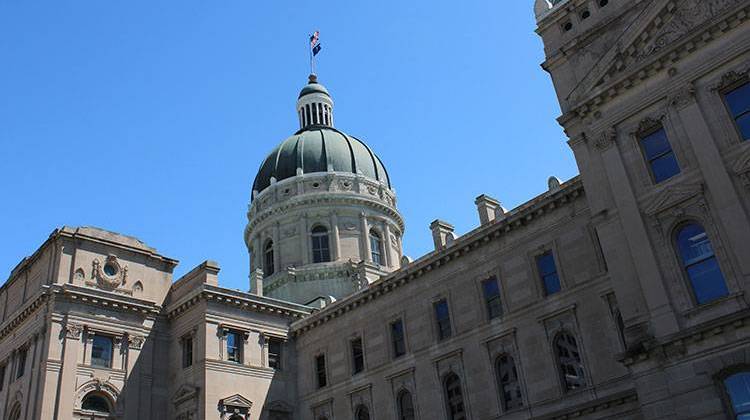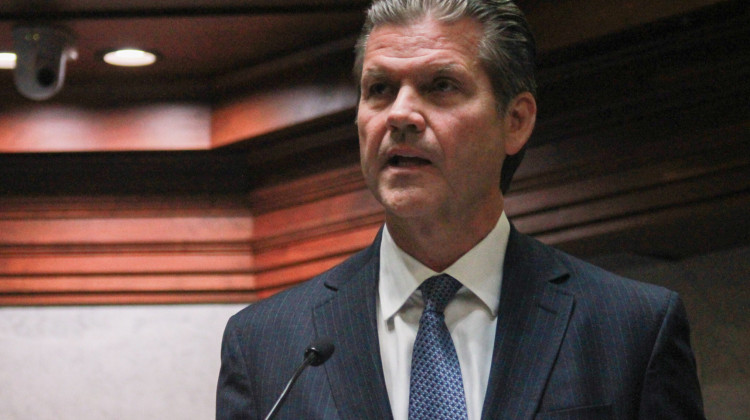The 2018 legislative session ended a bit more chaotically than expected, but lawmakers managed to work on and pass a variety of education legislation this year. But, some bills didn’t find the same levels of success as others. Here’s a recap of some legislation lawmakers proposed, passed, and denied around education policy.
The bills that failed
School Financial Management/Gary-Muncie Takeover Bill: HB 1315
In a major plot twist, the controversial school takeover/financial management bill failed in the final minutes on the last day of session. Lawmakers from Muncie and Gary pushed back on the bill regularly as it moved through the legislature, saying it would unfairly penalize school officials, take power away from local communities, and intervene in financially distressed school districts that have had less than a year to balance school budgets. Those conversations also overshadowed another aspect of the bill that would have created a dashboard for the state to monitor districts’ financial health – and offer assistance – if too many red flags popped up.
School Safety: HB 1230
Another unexpected bill death was a school safety bill that received approval in the Senate, but failed in the House. Initially, this bill addressed cyberbullying and human trafficking by requiring additional teacher training and online resources. But after February’s school shooting in Parkland, Florida, lawmakers added language around school safety specialists and emergency plans in the bill. It also included an additional $5 million for school safety grant funding, per a request from Gov. Eric Holcomb. But a provision for schools to receive loans from the state to pay for school safety system and program improvements through the common school fund, ended up proving fatal for the bill.
Cursive writing: SB 8
Sen. Jean Leising (R-Oldenburg) has made several attempts – one every year since 2011, in fact – to pass a bill requiring all schools teach cursive writing. The bill’s usual pattern played out again this year: the Senate passed the bill without much pushback, and then lawmakers in the House shot it down. The problem? Leising says it’s the doing of House Education Committee Chair Bob Behning (R-Indianapolis), who won’t hear the bill in his committee. After Behning refused to hear her bill, Leising attempted to add the language into another education bill, HB 1420, but it was turned into a legislative encouragement instead of a mandate. It says schools “may” teach cursive, but that’s already how the system works, with a few Hoosier schools still including cursive in their curriculum.
Compulsory School Age
A couple of bills were filed this year to lower the state’s compulsory school age from 7-years-old to 5. It was a priority for Superintendent of Public Instruction Jennifer McCormick as well the Indiana State Teachers Association. None of those bills were heard in committee, in either chamber.
Those that passed
School Funding Gap Fix: HB 1001
The state saw a surprise uptick in public school student enrollment, which led to a shortfall in funding for public schools. Lawmakers have known about it since December, but as more enrollment data was finalized during the session, the gap grew to more than $22 million for this school year. House Ways and Means Committee Chair Tim Brown (R-Crawfordsville) doubts that the state will see another, or an even bigger, shortfall next year, but the final bill makes $25 million available from the state’s reserve fund to close that gap this year, and another $75 million next year to close any more unexpected gaps.
One High School Diploma: HB 1426
Once the governor signs this bill, the state will see a single high school diploma structure, largely to align the state with federal graduation rate calculations. The current structure with the new federal rules would mean some schools could see a big drop in graduation rates, prompting action from the government.
Students will still be able to add distinctions to their diplomas for different academic tracks with the new system, like Core 40, academic or technical honors. It also creates an alternate diploma for students with severe cognitive disabilities, and requires the State Board of Education to look into alternative math courses to Algebra 2. The final version also postpones the timeline for changing the state’s high school graduation exam to either the SAT or ACT until new graduation pathway requirements kick in, in 2021.
Coalition Schools Pilot: HB 1398
Innovation in schools is the main theme for this bill, inspired largely by Batesville Community Schools. It creates a pilot program for schools to join a coalition, or as Batesville Superintendent Paul Ketcham put it, a “think-tank that becomes a do-tank.” It means schools can join the coalition to share ideas and best practices, and see what works in different communities. A key point: coalition schools can ask the State Board of Education for permission to waive some state requirements for the sake of improving student learning. Ketcham says the board could waive things like how much time a student is required to spend in a certain class, in exchange for a workplace learning experience.
Sex Education: SB 65
Initially, the bill’s author, Senate Education and Career Development Committee Chair Dennis Kruse (R-Indianapolis) drafted language prohibiting schools from teaching sex education without parental consent, including topics like sexual orientation and gender identity. Meaning schools would not be allowed to include kids in sex education courses if their parent didn’t consent – or didn’t respond.
But that was changed in the House. Now, schools will have to ask parents for consent and wait to hear back for at least 21 days before sending a second notice. And then 10 days after sending the second note home, if a parent doesn’t respond schools can include that student in sex education courses. The final version does not explicitly include sexual orientation and gender identity, but says the rules apply to material around “human sexuality.”
School Discipline: HB 1421
The legislation aims to reduce the rate of expulsions and suspensions for students, specifically those who often face disproportionate rates of discipline, like low-income or minority students. It requires school discipline plans to include ways to reduce out of school suspensions or expulsions, and for IDOE to survey schools this year on different restorative discipline practices being used (like conflict resolution or relationship building and healing). It also asks for a study committee on positive discipline practices.
Dyslexia: SB 217
Sen. Erin Houchin (R-Salem) took this bill on after her own son was diagnosed with dyslexia. Under the bill, each school corporation, and the State Department of Education will be required to hire a reading specialist trained in identifying teaching kids with dyslexia. A piece of the bill advocates see as an even bigger win is a part requiring schools to screen kids for dyslexia in kindergarten through second grade, and notify parents of any indicators that could mean a student has dyslexia.
Soft Skills: SB 267
Employability skills are also known as “soft skills” and include things like showing up to work on time, and how a person communicates with others. Schools will be required to adopt standards around those skills in their curriculum, and the legislation establishes something called the Work Ethic Certificate Program. The governor signed the bill during the final week of the legislative session.
Computer Science: SB 172
Computer science was a priority for Governor Holcomb this year, and the General Assembly delivered. Now, all schools in the state will be required to offer at least one computer science course by 2021. It also provides for funding to help train teachers in computer science to offer those classes.
Teacher Licensing/Pay: SB 387
This bill aimed to address the state’s teacher shortage, by focusing on teacher licensing. But after attempts to give schools flexibility in hiring unlicensed teachers or waive some content exam requirements for new educators, the final bill focused more on supplemental and differentiated pay for some teachers, including in STEM and special education. It also makes pedagogy, or the way students learn, a requirement for any teachers with career specialist permits, and requires IDOE to investigate teacher licensing exams.
Workforce Development: SB 50
This bill creates the governor’s workforce cabinet to oversee workforce development programs and strategies for Indiana, with Superintendent McCormick included in that group. Another piece of the bill says the cabinet will create a career coaching program by this summer, and requires all charter, nonpublic and public high schools to use it.
HB 1399: Elementary Content Licenses
Some people have questioned how effective the part of this bill that asks the state board to create an elementary math, or math and science teacher license. But it received praise from some groups for the provision requiring the creation of an elementary math specialist license. They say math specialists could act as coaches or leaders in their schools to help others better instruct students in math classes.
Bullying: HB 1356
Rep. Greg Porter (D-Indianapolis) authored this bill, for the state to get more, better information on bullying in schools. It says IDOE needs to send an annual reminder to schools letting them know it’s still required to submit data around bullying instances, and that the department can audit those reports. It also requires the department to share with lawmakers the results of a survey from the department on schools’ efforts to improve bullying reporting.
Foster Care, Homeless Student Outcomes: HB 1314
More information will become available around foster care and homeless students in schools through this bill. It requires IDOE, in partnership with the State Board and Department of Child Services to submit an annual report on things like graduation, expulsion, and pre-K enrollment for those students. A provision added to the bill in the second half of the session also requires a similar report on homeless students.
Various Ed Matters: HB 1420
The part of 1420 that’s received the most attention, is likely the provision allowing students who attend nonpublic schools to attend the Indiana School for the Deaf part time if they need to. The bill includes a number of other pieces around education policy, including a requirement that students who are withdrawn from virtual charter schools for failure to participate can’t re-enroll in that school the same year.
Student Sunscreen: SB 24
Rules around student sunscreen use haven’t been uniform across the state, but some schools treat it similarly to over the counter medication, like ibuprofen. That means students might have to leave it with school nurses or their teacher, or have a doctor’s note to use it. But SB 24 changes that, and says students can carry sunscreen at school without the extra steps. This was one of the first bills Governor Holcomb signed into law this year.
 DONATE
DONATE








 Support WFYI. We can't do it without you.
Support WFYI. We can't do it without you.